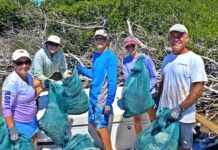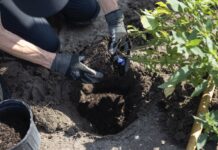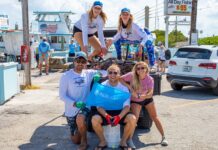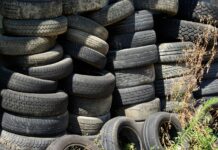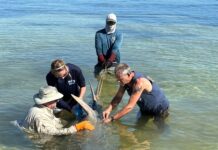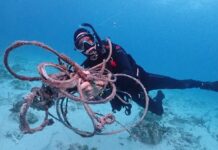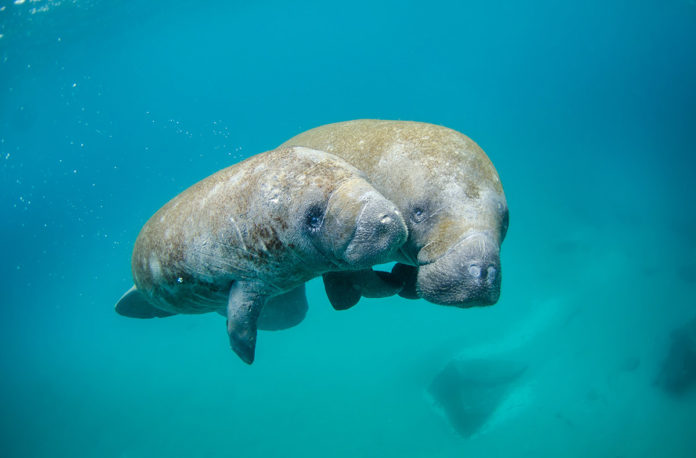
To live in Florida, you must love manatees. They’re hopelessly awkward, adorably plump sea potatoes. And, although we’ve never hugged any (we promise — we know it’s illegal!), we find them extremely cuddly.
If you’ve been following the news, you’ve probably heard about the terrible things happening to manatees up north. More of these marine mammals have died in 2021 than in any other year in Florida’s history — and it’s only July.
As of the last Florida Fish and Wildlife Conservation Commission (FWC) report, at least 841 manatees had died this year in Florida waters. The five-year average for annual deaths is 578, NPR reported. The previous record was set in 2013, when 830 manatees died after exposure to red tide toxins.
The majority of losses have been in the Indian River Lagoon in Brevard County. Manatees normally spend winters migrating through Florida’s waterways in search of warm water and lots of their favorite food: seagrass. Unfortunately, seagrass beds have also been dying off in record numbers this year.
Biologists are pointing to poor water quality as a primary cause and blame wastewater contamination and nutrient runoff for causing the former.
“Runoff is bad for marine and coastal environments because it washes everything that is in the streets, in homeowner’s yards, in the grass and golf courses and the stormwater system into the water,” said Rachel Silverstein, executive director and waterkeeper for Miami Waterkeeper. “The pollutants include nutrients like phosphorus and nitrogen from fertilizer, fecal matter from pets and wildlife, plastic debris and trash, and grass clippings and other vegetation (which supplies nutrients to the water and provides an ideal home for bacteria) and more.”
As polluted waters enter marine habitats like Indian River Lagoon, the nutrients fertilize algae in the water. As these toxic red tides and algal blooms grow in size, they cover seagrasses and shade out sunlight. This eventually can kill the seagrass, leading to oxygen depletion in the water, which then leads to the death of marine life as well, Silverstein added. High water temperatures and slow-moving currents exacerbate the seagrass die-off, NBC reported. As this key manatee food source runs out, the giant sea cows suffer malnutrition and starve to death.
When manatees are found sick and injured, people call in experts to help. Rescued animals are often moved to special holding facilities like Sea World Orlando and Miami Seaquarium. “Skinny” manatees are fed and rehabilitated until they are deemed ready for release back to the wild, said Ben Daughtry, the owner of Florida Keys Aquarium Encounters in Marathon. Aquarium Encounters will sometimes aid in manatee rescues in the Keys.
So, what’s that have to do with the Keys? A lot, apparently.
“I think it is incredibly important to frame the conversation surrounding the manatee fatality event in the Indian River Lagoon within the context of Everglades restoration,” said Emma Haydocy, executive director at Florida Bay Forever. “Prior to human alteration and intervention in the ecosystem, water flowed from Lake Okeechobee south to what is now Everglades National Park and Florida Bay. Now, lake water is discharged to the St. Lucie river, with the (Indian River Lagoon) on the receiving end of billions of gallons of nutrient-laden, often toxic water. Toxicity and harmful impacts are multiplied by fertilizer, storm water and septic system runoff.”
The same water that Florida Bay desperately needs is instead being flushed out, full of runoff and toxins, to the Indian River Lagoon. There, it’s killing the seagrass and causing manatees to starve.
Florida Bay and the Keys marine ecosystem are not free from our own runoff problems either.
“Our shallow, tropical habitats are particularly sensitive to nutrient pollution, and we are vulnerable to algal blooms as a result,” Silverstein said.
Runoff from the island chain and mainland has brought in nutrients, chemicals and bacteria which affect the health of our seagrass, water quality and marine life, she added. Additionally, land-based fertilizer runoff has been linked to sargassum blooms, which have become an environmental issue both on a global scale as well as in the Keys, she said.
The issues that already plague Florida Bay — excessive nutrient runoff and the lack of clean fresh water coming down through the Everglades — could eventually lead to the Keys own environmental disaster, the experts warned. To avoid this, we need to keep our water quality high.
So, are our Keys manatees safe? For now, it seems like they are still more affected by boat strikes, Daughtry said. Nevertheless, our seagrass habitats are fragile and getting cut up by propeller scars daily. Florida Bay is constantly under threat from too little water and too many nutrients. If these factors worsen, our waters might also become inhospitable to manatees.
Nevertheless, Haydocy still has a glimmer of hope.
“There is always opportunity to implement stronger water quality policy on the local, state, and federal level that addresses point sources of runoff in the Florida Keys, but I think that we are leaps and bounds ahead of other municipalities across Florida,” Haydocky said. “Monroe County made the investment in septic to sewer conversion, passed a strong fertilizer ordinance in 2021, and continues to support restoring America’s Everglades. These investments in water quality form a mosaic of environmental policy and protection that can help save manatees and all marine life on Florida Bay.”
To report a sick, injured, dead or tagged manatee, call FWC’s Wildlife Alert Toll-Free Number: 1-888-404-FWCC (3922).
Ways to prevent runoff, from Miami Waterkeeper:
- Clean up after your pets so there is no pet waste in the yard or street that could run down a drain
- Skip fertilizer use in rainy summer months and leave at least a 20-foot buffer zone around waterways and storm drains
- Skip the phosphorus and only use a limited amount of nitrogen, 65% of which should be slow release
- Use native plants in your yard, as they have evolved to thrive in our environment without chemicals or fertilizers
- Avoid the use of harsh chemicals, such as pesticides and herbicides, as what goes on land eventually ends up in our water
- Never throw grass clippings or leave into the storm drain or canals


















